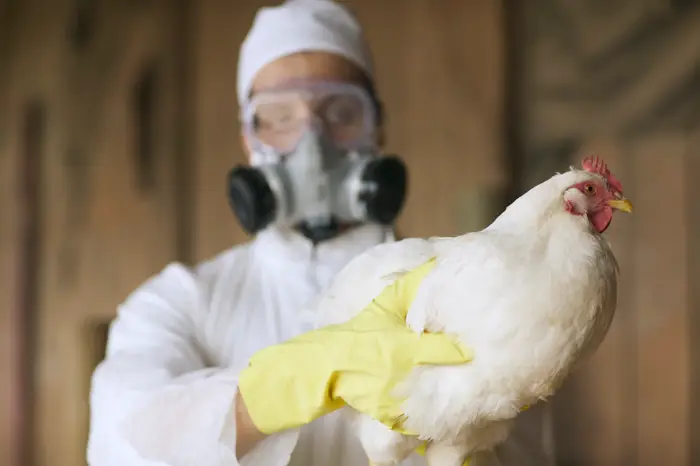Should You Worry About Bird Flu? Experts Explain the Current Risks and Precautions
The bird flu, specifically the H5N1 strain, has recently been spreading among dairy cows in California, Idaho, and Utah. While the virus primarily infects wild birds, it began impacting commercial poultry in 2022 and has now been detected in cattle since March 2024. Although there have been a few human cases linked to exposure to sick animals, experts emphasize that the situation is currently contained.
Current Situation with Bird Flu
The H5N1 outbreak was first identified in wild birds in January 2022 and quickly made its way to commercial poultry, affecting turkeys shortly after. Since then, the virus has been detected in various animals, including cattle, goats, alpacas, and even a pig. According to Dr. Amesh Adalja, an infectious disease expert, the ongoing outbreak is largely due to an increase in avian influenza activity among wild birds that has spilled over into livestock.
Notably, this is the first time dairy cattle have been infected with H5N1, which raises concerns because there is no flu vaccine for cattle, and the dairy industry has never faced such a challenge before. The detection of H5N1 in pigs is particularly alarming since pigs can be infected by both human and avian viruses, potentially leading to the creation of new influenza strains that could infect humans.
Can Humans Contract Bird Flu?
As more animals become infected, the likelihood of human exposure increases. In April 2024, a person tested positive for H5N1 after exposure to infected cows, marking the first known case of cow-to-human transmission. By May, several additional cases were reported among individuals who had contact with infected dairy cows. In total, 46 people in the U.S. have been diagnosed with bird flu this year due to exposure to infected animals.
A July 2024 study suggested that the actual number of infections might be higher than reported, indicating that approximately 14.3% of farm workers tested had antibodies for H5N1, suggesting prior exposure to the virus.
Public Health Threat Assessment
According to the CDC, all cases documented in the current outbreak have been classified as sporadic instances of animal-to-human transmission. The risk to the general public remains low since there has been no evidence of human-to-human spread. For the virus to start spreading among humans, significant genetic changes would be necessary, allowing it to bind more effectively to human receptors.
For those concerned about food safety, it’s important to note that pasteurized milk is safe, and properly cooking meat should eliminate any risk of the flu virus. Most reported symptoms in infected individuals have been mild, primarily respiratory issues and conjunctivitis. So far, no farmworkers diagnosed with HPAI have required hospitalization.
Preparedness for a Larger Outbreak
Experts warn that surveillance and testing efforts have not kept pace with the virus’s spread, which could allow it to adapt to humans. The U.S. Department of Agriculture has announced plans to enhance testing, collaborating with state veterinarians to bulk-test milk samples to understand where H5N1 is spreading.
Dr. Richard Martinello stresses the importance of monitoring infections in animals, particularly pigs, as each new infection presents an opportunity for the virus to evolve. If clusters of human infections begin to emerge, it may indicate that the virus has gained the ability to spread among people.
Vaccination and Prevention
While vaccines for H5N1 have been developed, they are not yet publicly available. Experts recommend focusing on seasonal influenza vaccination as a more immediate protective measure, as seasonal flu poses a greater threat to public health than H5N1 at this time. Dr. Martinello emphasizes that getting vaccinated against seasonal influenza is a crucial step for personal protection.
Conclusion
While the current situation regarding bird flu is concerning, experts believe the risk to the general public remains low. Close monitoring of animal infections and enhanced testing will be vital in preventing the virus from adapting to humans. For now, staying informed and getting vaccinated against seasonal influenza are the best ways to protect yourself.
Thank you for taking the time to read this article! Your thoughts and feedback are incredibly valuable to me. What do you think about the topics discussed? Please share your insights in the comments section below, as your input helps me create even better content.
I’m also eager to hear your stories! If you have a special experience, a unique story, or interesting anecdotes from your life or surroundings, please send them to me at whatsissue@gmail.com. Your stories could inspire others and add depth to our discussions.
If you enjoyed this post and want to stay updated with more informative and engaging articles, don’t forget to hit the subscribe button! I’m committed to bringing you the latest insights and trends, so stay tuned for upcoming posts.
Wishing you a wonderful day ahead, and I look forward to connecting with you in the comments and reading your stories!
